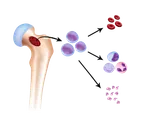- Home
- Browse by Disease
- Acute promyelocytic leukemia
Acute promyelocytic leukemia
- Other Names:
acute myeloblastic leukaemia 3; acute myeloblastic leukaemia type 3; acute myeloblastic leukemia 3; acute myeloblastic leukemia type 3; acute myeloid leukaemia m3; acute myeloid leukaemia with t(15; 17)(q22; q12); (pml/raralpha) and variants; acute myeloid leukemia m3; acute myeloid leukemia with t(15; 17)(q22; q12); (pml/raralpha) and variants; acute promyelocytic leukaemia; acute promyelocytic leukaemia with pml-rara; acute promyelocytic leukaemia with t(15; 17)(q22; q12); pml-rara; acute promyelocytic leukaemia with t(15; 17)(q22; q12); pml/rara; acute promyelocytic leukemia (clinical); acute promyelocytic leukemia with pml-rara; acute promyelocytic leukemia with t(15; 17)(q22; q12); pml-rara; acute promyelocytic leukemia with t(15; 17)(q22; q12); pml/rara; acute promyelocytic leukemia, fab m3; aml m3; aml with t(15; 17)(q22; q12); aml with t(15; 17)(q22; q12); (pml/raralpha) and variants; apl; apl - acute promyelocytic leukemia; apml; apml - acute promyelocytic leukaemia; apml - acute promyelocytic leukemia; fab m3; leukemia, acute promyelocytic, somatic; m3 - acute promyelocytic leukemia; promyelocytic leukaemia; promyelocytic leukemiaacute myeloblastic leukaemia 3; acute myeloblastic leukaemia type 3; acute myeloblastic leukemia 3; acute myeloblastic leukemia type 3; acute myeloid leukaemia m3; acute myeloid leukaemia with t(15; 17)(q22; q12); (pml/raralpha) and variants; acute myeloid leukemia m3; acute myeloid leukemia with t(15; 17)(q22; q12); (pml/raralpha) and variants; acute promyelocytic leukaemia; acute promyelocytic leukaemia with pml-rara; acute promyelocytic leukaemia with t(15; 17)(q22; q12); pml-rara; acute promyelocytic leukaemia with t(15; 17)(q22; q12); pml/rara; acute promyelocytic leukemia (clinical); acute promyelocytic leukemia with pml-rara; acute promyelocytic leukemia with t(15; 17)(q22; q12); pml-rara; acute promyelocytic leukemia with t(15; 17)(q22; q12); pml/rara; acute promyelocytic leukemia, fab m3; aml m3; aml with t(15; 17)(q22; q12); aml with t(15; 17)(q22; q12); (pml/raralpha) and variants; apl; apl - acute promyelocytic leukemia; apml; apml - acute promyelocytic leukaemia; apml - acute promyelocytic leukemia; fab m3; leukemia, acute promyelocytic, somatic; m3 - acute promyelocytic leukemia; promyelocytic leukaemia; promyelocytic leukemia
Read More
Read Less








